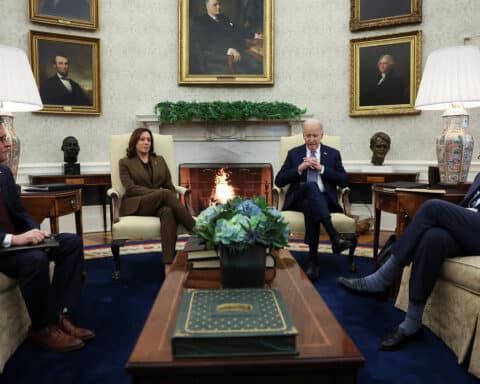
They will never know Christians by our love if we are so proudly hateful on social media and elsewhere.
On the eve of All Saints’ Day, a total rumor about Nancy Pelosi’s husband was trending on Twitter. Some of those posting it found it a triumph of free speech with the takeover of Twitter by Tesla owner Elon Musk. Republicans were no longer being banned from saying what they thought! Is this really who Republicans want to be in 2022?
It’s one thing to ask questions about perhaps there being more to the story than we know. (I also am not sure we are entitled to the whole story.) It’s another to actively assert what must have happened. There’s something decent about not commenting on a story before you know the facts. There’s something decent about not pontificating about a political enemy’s husband while the man was attacked, however it happened, less than 24 hours before. There’s something decent about praying for people who are suffering — even if you disagree with them about politics.
As I sat in horror watching Twitter that Friday night, I kept thinking about how Nancy Pelosi so many times over the years has talked about being a mother and grandmother. (She often would bring this up to put a male reporter in his place when asking her about abortion. It happened a number of times to my colleague at National Review, John McCormack.) As confused as her position on abortion is, she clearly loves her family and sees her role as wife and mother as key to her identity. She deserves better than having the father of her children talked about in crude and cruel and lurid ways.
People who consider themselves pro-life, in particular, need to pay attention to what went on in the hours and days after the Paul Pelosi news broke. We cannot consider ourselves pro-life and dehumanize people in such a way. We will also never build a culture of life and civilization of love by making vile jokes about people, even if they are Democrats who support expanding abortion. We oppose abortion not just because it is evil, but because we love. Women and children and men and families deserve better than abortion. That’s why, in this post-Roe v. Wade America, we need to reach out in new and innovative ways to make sure moms and families can flourish. People must see us love — even in our political rhetoric and social media postings.
On that Sunday afternoon, I was having post-Mass tea with someone who had been to dinner the night before with a couple whose children were in school with some of the Pelosi grandchildren. Their first reaction was love for the family, because they don’t have the luxury of thinking of the Pelosis simply as “them” and “enemy.”
No one has an excuse. I get that people are mad about all sorts of things. What I saw on social media was a reminder why wrath is one of the deadly sins.
No violence in politics is acceptable. Nor is gossip. The Christians — who claim to believe in Jesus, who died on the cross in the greatest injustice we have perpetrated — and the mothers and the fathers, and all of us who claim to care about things like virtue, need to lead the way in turning down the temperature. And praying for our political opponents, who are human beings with all kinds of challenges, too.
Kathryn Jean Lopez is a senior fellow at the National Review Institute and editor-at-large of National Review.





